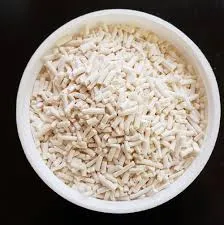
Sustainable Organic Fertilizers for Enhanced Soil Health and Sustainable Agriculture Practices
The Benefits of Bio-Organic Fertilizer
In recent years, the agriculture industry has witnessed a growing interest in sustainable farming practices. One of the key players in this movement is bio-organic fertilizer, a product that combines the benefits of organic materials with the scientific advantages of bioengineering. This article explores the importance, benefits, and applications of bio-organic fertilizer in modern agriculture.
What is Bio-Organic Fertilizer?
Bio-organic fertilizer is a type of fertilizer that consists of organic substances, such as animal manure, plant materials, and microorganisms. Unlike conventional fertilizers that often rely heavily on chemical compounds, bio-organic fertilizers are designed to improve soil health naturally while promoting sustainable crop production. These fertilizers typically contain beneficial microorganisms that enhance nutrient availability while also improving soil structure.
Enhancing Soil Health
One of the main benefits of bio-organic fertilizer is its ability to enhance soil health. The microorganisms in these fertilizers play a crucial role in breaking down organic matter, which helps in the formation of humus—a vital component of healthy soil. Humus improves water retention, aeration, and overall soil structure, leading to a more hospitable environment for plant roots. Consequently, plants can access essential nutrients more efficiently, leading to improved growth and higher yields.
Nutrient-Rich Composition
Bio-organic fertilizers are rich in macronutrients such as nitrogen, phosphorus, and potassium, as well as essential micronutrients. These nutrients are often derived from natural sources, making them more readily available to plants. The slow-release nature of bio-organic fertilizers helps reduce the risk of nutrient runoff and leaching, which are common issues with synthetic fertilizers. As a result, bio-organic fertilizers offer a more sustainable option for nutrient delivery.
Environmental Benefits
bio organic fertilizer

The environmental advantages of bio-organic fertilizers are significant. By utilizing organic materials that would otherwise be waste, such as agricultural residues and animal manure, these fertilizers help in waste management and reduce greenhouse gas emissions. Furthermore, bio-organic fertilizers promote biodiversity by supporting a wide range of beneficial soil microorganisms, leading to a more balanced ecosystem.
Disease Resistance and Plant Health
Plants treated with bio-organic fertilizers often exhibit increased resistance to diseases and pests. The presence of beneficial microorganisms can help suppress pathogens in the soil, acting as a natural defense mechanism. Additionally, the improved nutrient uptake boosts plant health, making them more resilient to environmental stresses such as drought or extreme temperatures.
Application in Diverse Settings
Bio-organic fertilizers are versatile and can be used in various agricultural settings, including crop fields, gardens, and greenhouses. They are particularly beneficial in organic farming, where the use of synthetic fertilizers is prohibited. However, even conventional farmers are now recognizing the advantages of incorporating bio-organic options into their practices to enhance sustainability and improve soil health.
Conclusion
As the global demand for food continues to rise, the need for sustainable farming practices becomes increasingly urgent. Bio-organic fertilizers present a viable solution, offering numerous benefits that extend beyond mere nutrient supply. By improving soil health, enhancing nutrient availability, and promoting environmental sustainability, bio-organic fertilizers represent a forward-thinking approach to modern agriculture.
Farmers and agricultural stakeholders should consider integrating bio-organic fertilizers into their farming practices not just for the immediate benefits but also for their long-term positive impact on soil and environmental health. The future of sustainable agriculture lies in leveraging innovative solutions like bio-organic fertilizers to create a more resilient and productive farming system.
-
Why Glacial Acetic Acid Food Grade Is Essential in FlavorNewsMay.26,2025
-
Surging Export Growth of Food Additives in ChinaNewsMay.26,2025
-
How Ammonium Nitrate Fertilizer Boosts Crop YieldsNewsMay.26,2025
-
How 1,2,3-Benzotriazole Shields Plastics from UV DegradationNewsMay.26,2025
-
Cyanide in Gold Mining: Protecting People and the PlanetNewsMay.26,2025
-
Aluminum Hydroxide in Modern Sunscreen FormulationsNewsMay.26,2025
-
Understanding Synthetic Rubber OptionsNewsApr.27,2025
Hebei Tenger Chemical Technology Co., Ltd. focuses on the chemical industry and is committed to the export service of chemical raw materials.
-

view more DiethanolisopropanolamineIn the ever-growing field of chemical solutions, diethanolisopropanolamine (DEIPA) stands out as a versatile and important compound. Due to its unique chemical structure and properties, DEIPA is of interest to various industries including construction, personal care, and agriculture. -

view more TriisopropanolamineTriisopropanolamine (TIPA) alkanol amine substance, is a kind of alcohol amine compound with amino and alcohol hydroxyl, and because of its molecules contains both amino and hydroxyl. -

view more Tetramethyl Thiuram DisulfideTetramethyl thiuram disulfide, also known as TMTD, is a white to light-yellow powder with a distinct sulfur-like odor. It is soluble in organic solvents such as benzene, acetone, and ethyl acetate, making it highly versatile for use in different formulations. TMTD is known for its excellent vulcanization acceleration properties, which makes it a key ingredient in the production of rubber products. Additionally, it acts as an effective fungicide and bactericide, making it valuable in agricultural applications. Its high purity and stability ensure consistent performance, making it a preferred choice for manufacturers across various industries.











